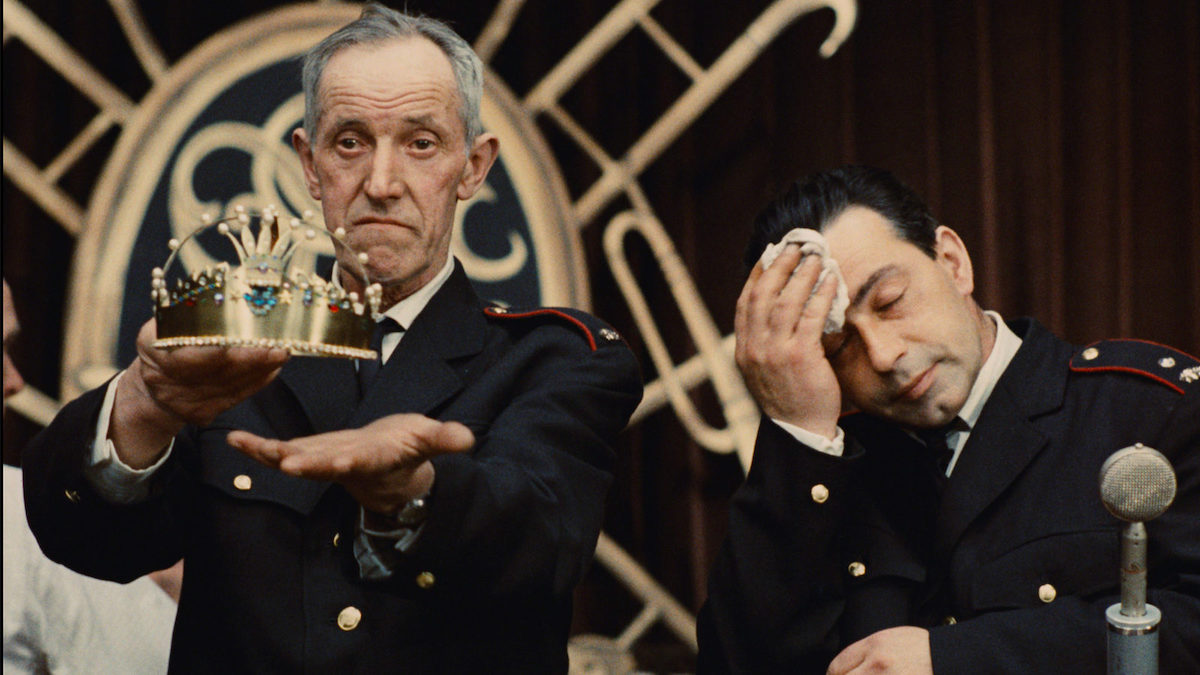Miloš Forman was an incredibly famous director in the 1980s, when his Amadeus (1984) won eight Oscars out of 11 nominations, and Ragtime (1981) also received eight nominations, period pieces about music’s potential for social transformation, overcoming prejudices or conventions, and making a new world. Similarly, in the 1970s he made very well-regarded pro-counterculture and antiwar movies like Taking Off (1971) and the musical Hair (1979), and especially his adaptation of Ken Kesey’s novel One Flew Over the Cuckoo’s Nest (1975), which won five Oscars out of nine nominations, including Best Picture and Best Actor for Jack Nicholson.
The beginning of Forman’s astonishingly successful Hollywood career, however, was a scandal about his 1967 film, The Firemen’s Ball, his last in his native Czechoslovakia. The comedy was a very popular satire, its success somehow connected with the collapse of Communist ideological censorship and terror (de-Stalinization) and the social revolution of the 1960s, the replacement of the older WWII generation by younger, more radically egalitarian 1968-ers. Forman also got an Oscar nomination for Best Foreign Film and an invitation to compete in Cannes (but the festival was shut down by radicals like Godard in support of the May 1968 riots).
The plot of The Firemen’s Ball is simple and quite farcical. In a small provincial town, a brigade of volunteer firemen wants to honor its retired chief at its annual ball, which also includes a raffle and a beauty pageant. These old men are our protagonists, hard at work imitating, and competing with, the Western capitalist world’s fun and games, but with meager resources and scant knowledge of the matter. They’re also attempting to dignify the whole social arrangement and uphold some form of public spirit. Since it’s a comedy, you can already guess that these fine intentions turn out to mean playing with fire. The comedy is about how each aspect of the proceedings fails and how the demands of the authorities, sometimes seeming more reasonable, other times hysterical, fail, since they’ve little or no legitimacy and not much more competence.
The ball is supposed to beautify the authorities and the community both, but in different ways. The firemen are in their uniforms, which imitate the military, and behave with no small amount of that claim to authority based on force. Force, however, though not always admirable, is always necessary—putting out fires is protecting the people, an image of political authority’s first duty. Honors beautify force, the rewards in reputation that immortalize daring and make it possible to dedicate oneself to dangerous service. The community is, contrariwise, supposed to take time off from work to enjoy the pleasures and entertainments available to civilized people. Elegance, wit, and grace beautify our everyday work, suggesting a freedom and a joy that complete our nature.
The difficulties, however, start with the opening scene, where a couple of old firemen fail to put out a small fire in the ballroom because their extinguisher doesn’t work and also fail to protect the goods to be raffled off, since there are thieves among them and little trust to go around. Then most of the movie is set during the ball itself, where we see that the firemen are part of the community they are supposed to protect and not at all of a different character. While these people may unite for singing and drinking together, since men and women naturally enjoy each other’s company, they are otherwise surprisingly corrupt. At some point, the comedy encourages the exasperated view that everyone steals! Obviously, lots of people also get drunk and out of control. This suggests the moral intention of the satire, to mock the pretenses of propriety and celebration behind which weakness and vice grow dangerously.
You can see why the Communists eventually decided that this was far too much truth about the effects of tyranny on character and community. The movie is hilarious and only 70 minutes long, so it feels like a sketch that keeps unfolding: you guess that things must keep falling apart, but not quite how, and you also admire the clever script that achieves so many pleasant surprises. It mocks its characters but without showing cruelty or malice; it is understandable that poor people might be less than idealistic and honest, especially when they are forced by tyranny into all sorts of pretenses. Indeed, the movie makes a virtue of poverty, as the Czechoslovak New Wave often did (other New Waves, too). It had a small budget, so it simply used a provincial location and the locals as extras, with few professional actors. Thus, the farce becomes believable even as you wonder how they could get away with such a scandalous joke.
Comedy appears as an ally of political virtue and the vulgar friend of the decent, encouraging everyone not to be taken in by dazzle or moralism, but instead to hold on to their ordinary views regarding fair dealing, minding one’s business, and helping those in need, since they, too, are human. Comedy is philanthropic in a way the elites, the prestigious few, are not and cannot be. Those elites seem to be led by a terrible fear that if they should fail to pretend that they are omnicompetent and omniscient, the whole society must collapse. They therefore raise themselves up by lowering the rest of society while becoming blind to their own failures. Comedy suggests that it is that very pretense, hiding self-importance and selfishness behind idealism, that is the danger. You might think this is a problem in America, too, and that Americans might also have recourse to satire and farce to expose elite corruption in a popular way without, however, encouraging hatred.
After the Soviet invasion of Czechoslovakia, with the Warsaw Pact armies quelling the Prague Spring, Forman’s movie was banned and he understood his career would be over, so he moved to Hollywood, where his remarkable comic talent and inclination toward criticism of authority or convention or prejudice would be often enjoyed, always tolerated, and sometimes even celebrated. That was a time when comedy meant a lot more to Americans than it does now, and there’s a lot to learn about its uses to restore confidence in our modest capacity for reason and set limits to our endless capacity for the wishful, fantastic, and deluded. The capacity and even freedom of comedy can easily be lost, as I suggested last year, when I wrote about another Czechoslovak movie from the Prague Spring, The Joke, based on Milan Kundera’s debut novel. We should learn from older satires and restore comedy to its rightful place in democratic life, mocking our pretensions in outrageous caricature and suggesting modest improvements by getting us to a bit more reasonable and less ideological.

